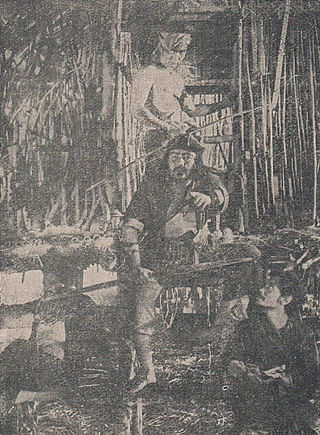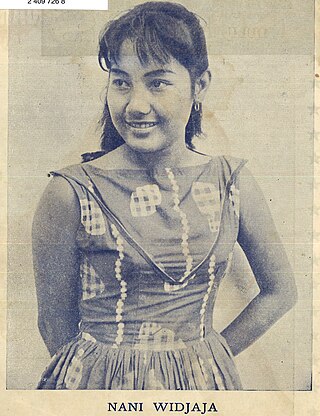Plot
Since birth Ponirah has lived a cursed life. Her mother died while birthing her and her brother Permadi is hit by a truck while riding a bicycle with her. This leads her father, Jabarudi, to go temporarily insane and nearly stab her with a kris . Their maid, Trindil (Christine Hakim), brings Ponirah with her and escapes the city, settling in Yogyakarta. Trindil becomes a prostitute to support herself and Ponirah; the two live at the brothel.
When Ponirah (Nani Vidia) is in senior high school, she finds that the new teacher Guritno (Slamet Rahardjo) is watching her closely. Unknown to her, he is in fact her uncle who was asked by Ponirah's late father to find her. After a misunderstanding with Trindil, Ponirah goes to Jakarta with a charming young man named Jarkasi (Ray Sahetapy), who is actually a trafficker tasked with luring young women to work as prostitutes. Although he falls in love with Ponirah and refuses to do this task, Ponirah says she wants to be the most expensive prostitute in the city. They part.
As Ponirah is picked up by a rich man named Franky Darling (Teguh Karya), Jarkasi meets Guritno and the two decide to save Ponirah. When they assault Franky's apartment, Ponirah – who has grown to hate men and intends to kill Franky – mistakes Guritno for her client and stabs her uncle with a pair of scissors, killing him. When the police come, Jarkasi tells them that he killed Guritno and prepares to be punished. However, the investigation reveals that Ponirah had delivered the killing blow and she is thus incarcerated.
Production
Ponirah Terpidana was written and directed by Slamet Rahardjo for Sukma Putra Film. It was produced by Manu Sukmajaya and A. Gunawan, with Tantra Surjadi on camera and editing by George Kamarullah. Rahardjo's brother Eros Djarot handled the musical arrangement, while Suparman Sidik handled sound. Benny Benhardi handled artistic direction.
The film starred Nani Vidia and Bambang Hermanto, with other roles filled by Christine Hakim, Bambang Hermanto, Slamet Rahardjo, Ray Sahetapy, Teguh Karya, Nano Riantiarno, and Ratna Riantiarno. Much of the cast had worked together for Karya's Teater Populer, with Hakim, Karya, Nano Riantiarno, and Rahardjo having previously collaborated on films like Cinta Pertama (First Love; 1973). Hermanto had been in cinema for over thirty years, rising to fame after starring in D. Djajakusuma's Harimau Tjampa (Tiger from Tjampa) in 1953. Meanwhile, Vidia was a new actor, making her feature film debut with Ponirah Terpidana.
Di Balik Kelambu is a 1983 Indonesian film directed by Teguh Karya. It stars Christine Hakim and Slamet Rahardjo.

Slamet Rahardjo Djarot is an Indonesian actor, director, and screenwriter of Javanese descent. He is the elder brother of director, songwriter, and politician, Eros Djarot. Since his directorial debut in 1979 with Rembulan dan Matahari, he has directed and/or written twelve films; one of which, Langitku, Rumahku, was Indonesia's submission to the 63rd Academy Awards in 1991.

Budak Nafsu is a 1983 Indonesian film directed by Sjumandjaja and adapted from the 1981 novel Fatima by Titie Said. Starring Jenny Rachman and El Manik, it follows a mother who is forced to serve as a comfort woman for Japanese men stationed in British Malaya in an effort to save her daughter. The film was a commercial success, although critics have emphasised its sexual aspects.

Pengkhianatan G30S/PKI is a 1984 Indonesian docudrama co-written and directed by Arifin C. Noer, produced by G. Dwipayana, and starring Amoroso Katamsi, Umar Kayam, and Syubah Asa. Produced over a period of two years with a budget of Rp. 800 million, the film was sponsored by Suharto's New Order government. It was based on an official history of the 30 September Movement coup in 1965 written by Nugroho Notosusanto and Ismail Saleh, which depicted the coup as being orchestrated by the Communist Party of Indonesia.

Janur Kuning is a 1980 Indonesian war film directed by Alam Surawidjaja and produced by Abbas Wiranatakusuma. Starring Kaharuddin Syah, Deddy Sutomo, and Dicky Zulkarnaen, it follows the Indonesian revolutionaries six-hour assault on Yogyakarta, under Suharto, in a show of force against the Dutch army. At the time the most expensive domestic production ever, the film's title is meant to symbolise the Indonesian people's struggle. A critical success, Janur Kuning received a nomination and two special awards at the 1980 Indonesian Film Festival. It was screened annually on 1 March between 1980 and 1998, but has since been criticised as an attempt to manipulate history and create a cult with President Suharto in the centre.

Serangan Fajar is a 1982 Indonesian war film directed by Arifin C. Noer and produced by G. Dwipayana. Telling the lives of several persons during the Indonesian National Revolution, the film used wayang imagery to show heroism. The critically acclaimed film has been read as emphasising then-President Suharto's role in the revolution, especially the General Offensive of 1 March.

Anak Perawan di Sarang Penjamun is a 1962 Indonesian film directed and produced by Usmar Ismail for PERFINI. Starring Bambang Hermanto and Nurbani Yusuf, it follows a young woman who is kidnapped by a group of bandits, only to fall in love with their leader. The film, adapted from the 1940 novel of the same name by Sutan Takdir Alisjahbana, was repeatedly blacklisted by the Indonesian government and only saw release several years after production ended.
The Citra Award for Best Director is an award given at the annual Indonesian Film Festival (FFI) to Indonesian film directors in recognition for their achievement in the previous year. The Citra Awards, described by Screen International as "Indonesia's equivalent to the Oscars", are the country's most prestigious film awards and are intended to recognize achievements in films as well as to draw public interest to the film industry.
Herwin Novianto is an Indonesian film director who won the Citra Award for Best Director at the 2012 Indonesian Film Festival for his drama Tanah Surga... Katanya . He later directed Aisyah, biarkan kami bersaudara in 2016 which starred Laudya Cynthia Bella.

Lembu Amiluhur Priyawardhana Priyono, generally referred to as Ami Prijono was an Indonesian film director and actor. He was married to the feminist writer Julia Suryakusuma.

Mieke Wijaya was an Indonesian actress, model, and politician who won three Citra Awards. She was crowned the best female antagonist in Indonesian film industry along with Suzzanna and Ruth Pelupessy. Wijaya began her career as a teenager and soared to popularity by partaking a role in Usmar Ismail's commercially successful Tiga Dara, her name became increasingly popular after starring in the soap opera Losmen in 1987.

Ellisa Meriam Bellina Maria Bamboe, or better known by her stage name as Meriam Bellina, is an Indonesian actress who has won three Citra Awards and acted in more than 50 films. Born and raised in Bandung, she dropped out of senior high school to begin a career as a model and actress. By the mid-1980s she was recognised as a "sex bomb" and "fantasy girl". During the 1990s she focused mostly on television series, but she has produced several feature films since 2007.

The Citra Award for Best Actor is an award given at the Indonesian Film Festival (FFI) to Indonesian actors for their achievements in leading roles. The Citra Awards, described by Screen International as "Indonesia's equivalent to the Oscars", are the country's most prestigious film awards and are intended to recognize achievements in films as well as to draw public interest to the film industry.

Zainal Abidin was a Citra Award-winning Indonesian actor who played in more than a hundred and fifty films.
Noesa Penida is a 1941 film from the Dutch East Indies which was directed by Andjar Asmara and produced by The Teng Chun of Java Industrial Film. It tells of a love triangle between two brothers, born to a commoner, and a noble woman.
The Citra Award for Best Supporting Actress is an award given at the Indonesian Film Festival (FFI) to Indonesian actresses for their achievements in a supporting role. The Citra Awards, described by Screen International as "Indonesia's equivalent to the Oscars", are the country's most prestigious film awards and are intended to recognize achievements in films as well as to draw public interest to the film industry.

Nani Widjaja was an Indonesian actress and model who won two Citra Awards for Best Supporting Actress. She was best known for her role in television Bajaj Bajuri. She was the part of Classical Indonesian Cinema.

Anastasya Soerip was an Indonesian singer and actress.

Rajuan Alam is a 1956 semi-documentary directed by Miriam Bucher and starring Bambang Hermanto and Lies Noor.
The Citra Award for Best Supporting Actor is an award given at the Indonesian Film Festival (FFI) to Indonesian actresses for their achievements in a supporting role. The Citra Awards, described by Screen International as "Indonesia's equivalent to the Oscars", are the country's most prestigious film awards and are intended to recognize achievements in films as well as to draw public interest to the film industry.














